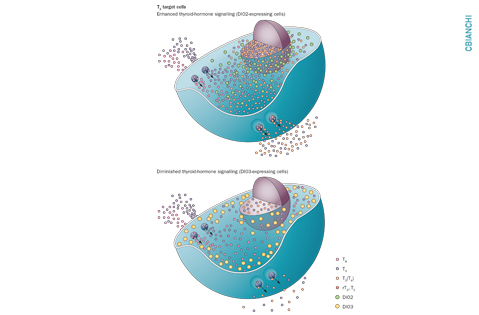The coordinated expression and activity of the iodothyronine deiodinases regulate thyroid hormone levels in hypothyroidism. Once heralded as the pathway underpinning adequate thyroid‐hormone replacement therapy with levothyroxine, the role of these enzymes has come into question as they have been implicated in both an inability to normalize serum levels of tri‐iodothyronine (T3) and the incomplete resolution of hypothyroid symptoms. These observations, some of which were validated in animal models of levothyroxine monotherapy, challenge the paradigm that tissue levels of T3 and thyroid‐hormone signalling can be fully restored by administration of levothyroxine alone. The low serum levels of T3 observed among patients receiving levothyroxine monotherapy occur as a consequence of type 2 iodothyronine deiodinase (DIO2) in the hypothalamus being fairly insensitive to ubiquitination. In addition, residual symptoms of hypothyroidism have been linked to a prevalent polymorphism in the DIO2 gene that might be a risk factor for neurodegenerative disease. Here, we discuss how these novel findings underscore the clinical importance of iodothyronine deiodinases in hypothyroidism and how an improved understanding of these enzymes might translate to therapeutic advances in the care of millions of patients with this condition.
Scope and limitations of iodothyronine deiodinases in hypothyroidism.
Gereben B, McAninch EA, Ribeiro MO, Bianco AC. Nature Review Endocrinology. September 29, 2015. PMID: 26416219
